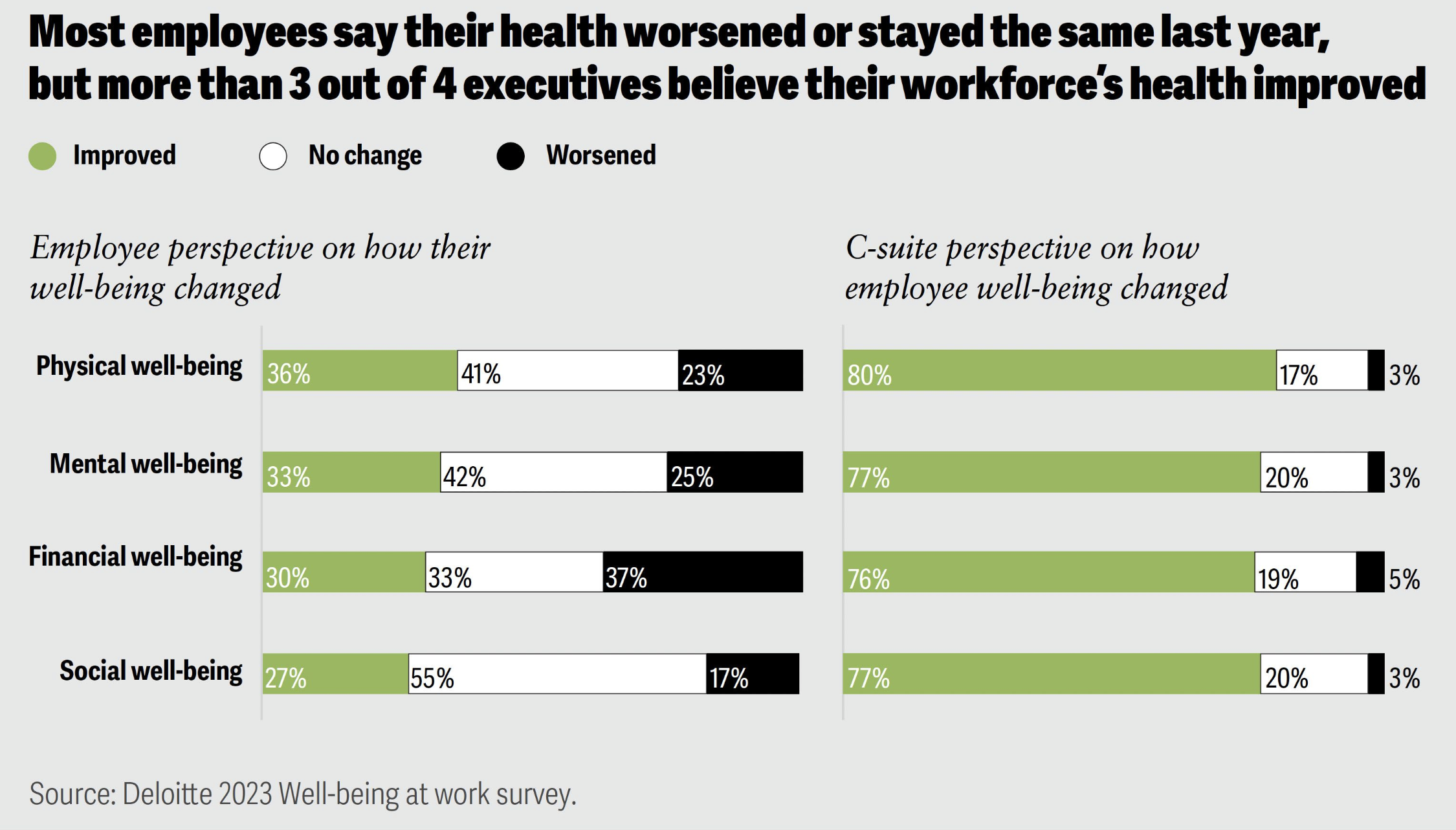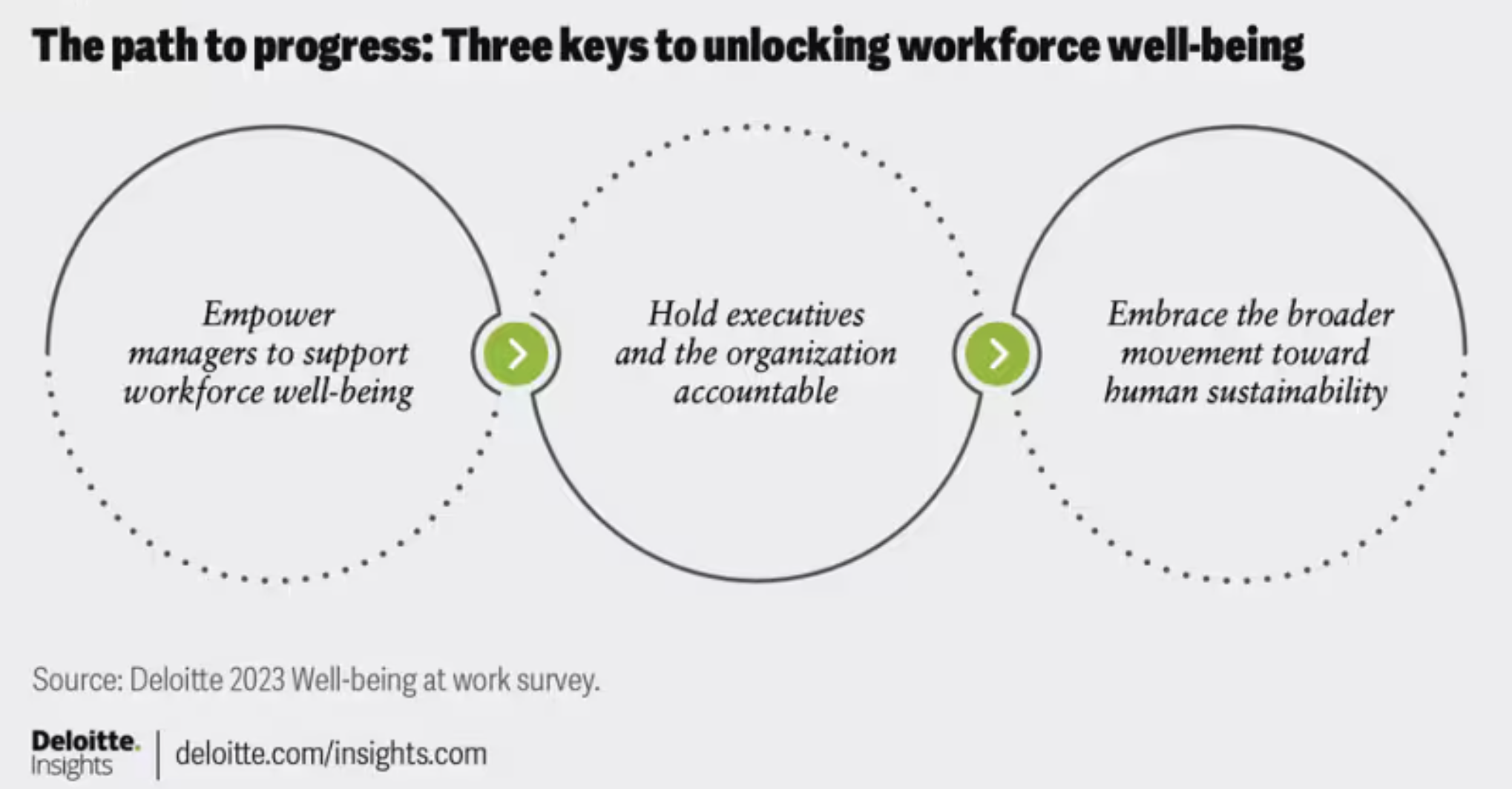From the April 2025 Gallup Report “State of the global workplace 2025”:
From a May 2024 Deloitte article “Poor mental health costs UK employers £51 billion a year”:
Meta-Analysis by Gallup on Employee Well-Being
Date: 2020–2021
Source: Gallup Research, Harvard Business School
This meta-analysis synthesized 339 independent studies with data from 1,882,131 employees across 82,248 business units. The research highlights a strong positive relationship between employee well-being and outcomes such as job satisfaction, organizational commitment, and performance. Additionally, it found a negative correlation with undesirable outcomes like stress, anxiety, cynicism, and turnover intentions. This robust study underscores the tangible benefits of fostering workplace well-being for long-term organizational success.
University of Oxford’s Wellbeing Research Centre Study
Date: 2019–2021
Source: University of Oxford Wellbeing Research Centre, Financial Times
This research revealed that happier employees are more productive, particularly in complex and demanding tasks. Organizations prioritizing employee well-being consistently outperformed market benchmarks, including the S&P 500 and Nasdaq. These findings highlight the financial and operational benefits of investing in workforce happiness, presenting well-being as a strategic advantage in competitive industries.
From an August 2023 Deloitte article based on their wellbeing at work survey:
“Work and wellbeing still aren't working well together”
“Employees’ self-reported wellbeing slightly declined across all dimensions since 2022. Less than two-thirds of workers say their physical and mental wellbeing are “excellent” or “good” (63 percent and 58 percent, respectively), and an even lower percentage rate their social (45 percent) and financial (35 percent) wellbeing positively.
In fact, most employees say their wellbeing either worsened or stayed the same last year, and only around one-third say their health improved. However, the C-suite presented a much different view: more than three out of four executives believe that their workforce’s wellbeing improved. This disconnect, which carries over from 2022, illustrates that leaders don’t have a firm grasp on how their teams are really doing.
The poor state of employees’ mental and physical wellbeing should be especially concerning for leaders. Many workers say they frequently feel negative emotions and fatigue. For example, 52 percent and 49 percent employees “always” or “often” feel exhausted and stressed, respectively. Others reported feeling overwhelmed (43 percent), irritable (34 percent), lonely (33 percent), depressed (32 percent), and even angry (27 percent). These issues aren’t limited to workers, however. Managers and executives are struggling too, and they are about as likely as employees (or in some cases, more likely) to report these sentiments.
Working on work
Eighty-four percent of survey respondents say that improving their wellbeing is a top priority this year, and 74 percent say it’s more important than advancing their career. However, 80 percent are facing obstacles—and most of these obstacles center around work. In fact, a heavy workload, stressful job, and long work hours topped the list of obstacles people say are getting in the way of improving their wellbeing, with nearly 74 percent saying they struggle to take time off or disconnect from work. Some other findings include:
52 percent reported they always or often use their vacation time annually
48 percent said they exercise each day
47 percent said they take microbreaks during the day
45 percent get at least seven hours of sleep
Given these findings, it’s not surprising that, like last year, only around one out of three employees feel their job has a positive impact on their physical (33 percent), mental (32 percent), and social (31 percent) wellbeing. Even more alarmingly, a significant percentage of employees say their job negatively affects their physical (33 percent), mental (40 percent), and social (21 percent) wellbeing.
Other key findings include a notable increase in the percentage of respondents reporting that they’re considering taking a job with another company that would better support their wellbeing. This year, 60 percent of employees and 75 percent of the C-suite say they’re seriously considering quitting, versus 57 percent and 69 percent last year, respectively. Nearly two-thirds of managers (64 percent) are also contemplating changing jobs in search of better well-being.”
From a June 2023 Deloitte article based on their well-being at work research:


